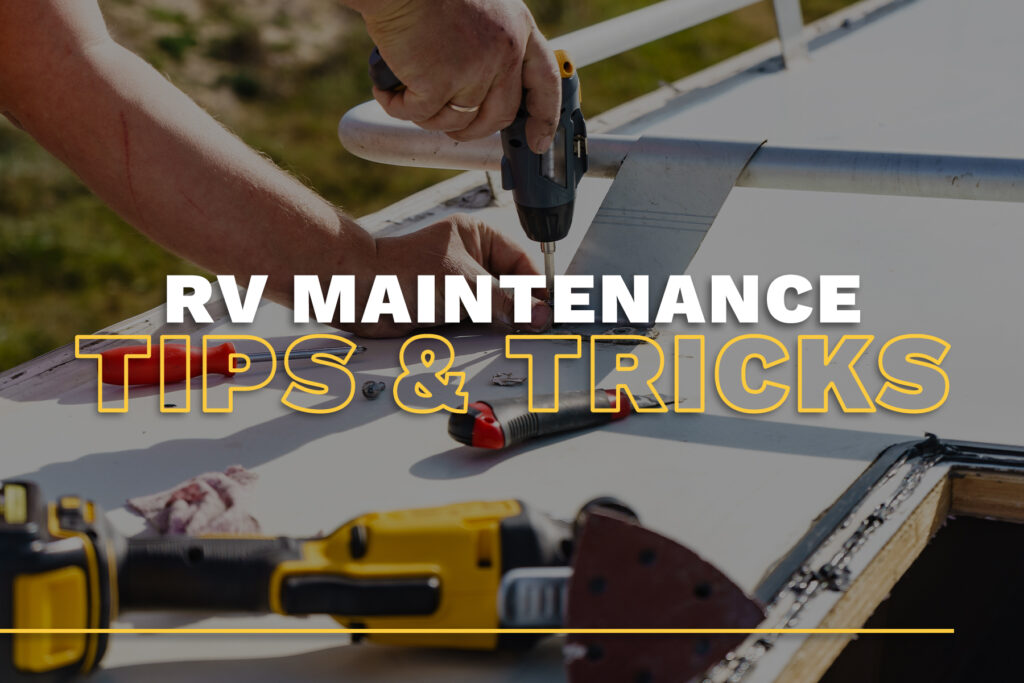So you bought the RV you were dreaming of. That’s great! But now comes the important part: maintenance. Whether your vehicle of choice is a travel trailer, fifth wheel, toy hauler or motorhome, taking care of your RV is essential to ensure it lasts for the years of family memories to come. For first-time RV owners and experienced pros alike, it can be hard to know where to start when taking care of your camper or what you should expect with routine maintenance. It’s important to remember that, just like your car, different components of your recreational vehicle will wear down over time and need some attention. Read below for our tips and tricks on how to keep your RV looking brand new!
Cover Your Roof
One of the best things you can do to protect your recreational vehicle is to keep it stored under an RV carport or in a traditional RV cover. Your camper’s roof bears the brunt of the elements, from sun rays to other environmental factors. This can create problems that might not be noticed right away. Since replacing or repairing the roof of your vehicle can be an expensive endeavor, storing it properly is the most economical way of protecting your investment. Steel carports that are customized for the size of your RV are an easily installed alternative option to the RV cover. However you decide to protect your roof, you’ll want to inspect it regularly to keep any issues from going unnoticed for too long. For more information, take a look at this article on the pros and cons of RV covers!
Maintain Your RV Tires
Ideally, you should maintain the tires of your RV as you would your everyday vehicle: rotating them periodically and monitoring them for damage. By using a tire pressure gauge or tire gauge, you can keep track of your tire pressure levels without simply “eyeballing it.” Help avoid your chances of needing roadside assistance due to flat tires by checking your tire pressure before every road trip. You should also be visually checking each tire for uneven tread wear, which can happen from improperly loading and unloading your trailer. When checking each tire, tighten the lug nuts to ensure that they haven’t become loose during travel or storage. Check out this RV tire care and maintenance guide for more tips!
Keep Your Waste Water System In Good Condition
There are several things you can do to keep your recreational vehicle’s wastewater system in good working order. You should be ensuring that you are using chemicals that are specifically designed to work with your specific system. Some RVs have black water systems, and others have gray water systems, so make sure you know what type of system your camper has. It is also important to flush your system on a regular basis to avoid excess amounts of buildup that can lead to clogging and operation failure.
Check All Window & Door Seals
One of the most common issues of an RV occurs when moisture leaks into the vehicle through faulty seals. When the seals on the windows and doors of your camper break down, they allow moisture to come through, damaging surfaces and creating a habitat for mold growth. A good way to help prevent damage is to be proactive: Check all seals around doors and windows every three months and check all roof seals around every six months. If you do find a loose seal or crack, you can get them removed and resealed by an RV service provider or, if DIY is more your speed, follow along with this YouTube video!
Service Your Water Heater
The water heater in your recreational vehicle is a simple system that provides a great convenience: hot water. But it can be easy to forget that they require regular maintenance as well. An easy way to maintain your water heater is to flush and drain it annually. You can flush the water heater with a flush wand and when it’s empty, you can check the condition of the tank to see if there is any rust. It’s a good idea to perform this cleaning process and inspection before each road trip so you don’t run into any problems on the road or at the campground. Take a look at this video with tips to clean your water heater and common mistakes you can avoid!
Winterize Your RV
Packing up your vehicle and storing it for the winter can be a tedious task, but it is essential to take these preventive measures. Properly winterizing your recreational vehicle can save you from potentially costly repairs when the camping season comes back around. There are a variety of things to check when winterizing your RV, so having a winterizing checklist is a smart way to ensure that nothing gets left out. If you’d rather not winterize an RV on your own, reach out to your local ROUTE 66 Network RV Dealer! Our RV Dealers’ holistic processes can take the headache and hassle out of winterization.
Rodent Proof Your Vehicle
No one wants uninvited guests popping up during a camping trip. From mice to insects, the critters of the great outdoors can cause a wide variety of problems indoors. From removing insulation to chewing on wires or building nests inside of your camper’s furnace, the damage animals cause can lead to an exorbitant amount of time and money spent looking for a solution. Before storing your RV during the off-season, double-check that all locations with wires, gas lines and insulation are properly and tightly sealed. Two simple items to seal these areas and protect your RV from animals are spray foam and steel wool. Use these in any holes you find where animals could get inside.
Keep Your Vents Open
Some RV maintenance tips don’t involve spending hard-earned money. When your RV is not in use, especially during the hot summer months, the interior temperature can climb astronomically. These extreme temperatures can cause seals, seams, flooring and fabrics to break down. To combat extreme heat, keep the vents of your RV open to help increase airflow and lower the temperature. Be sure you have vent covers over your exterior vents to prevent rain, animals, or bugs from entering your camper.
Maintain Your Brakes
Just like the brakes on your car, you’ll need to periodically change the brakes on your RV. Appearances can be deceiving. Even if your camper looks like it’s in perfect mint condition, it’s important to ensure that the brakes are working properly and safely. Whenever you get the feeling that your RV brakes don’t have enough traction left, it’s probably the best idea to get them replaced. When it comes to the safety of you, your passengers, and other drivers on the road, it’s always better to be safe than sorry.
- Clean Your Slide-Outs
All of the slide-outs of your camper regularly need a thorough cleaning. Dirt and debris can build up over time, eventually leading to wear and tear on the mechanism. There are a variety of lubricants you can purchase to ensure that the slide-outs are moving in and out of the unit easily. You can also use these products on the windows to add another measure of protection for the rubber sealant. Be sure to remember to clean the slide-outs on your RV after each trip to avoid costly damages!
For more RVing tips, travel guides, and general information, be sure to check out ROUTE 66 RV Network’s blog. If you’re looking for a new recreational vehicle, our RV dealer locator can help you find the nearest ROUTE 66 RV Network dealer to you.




